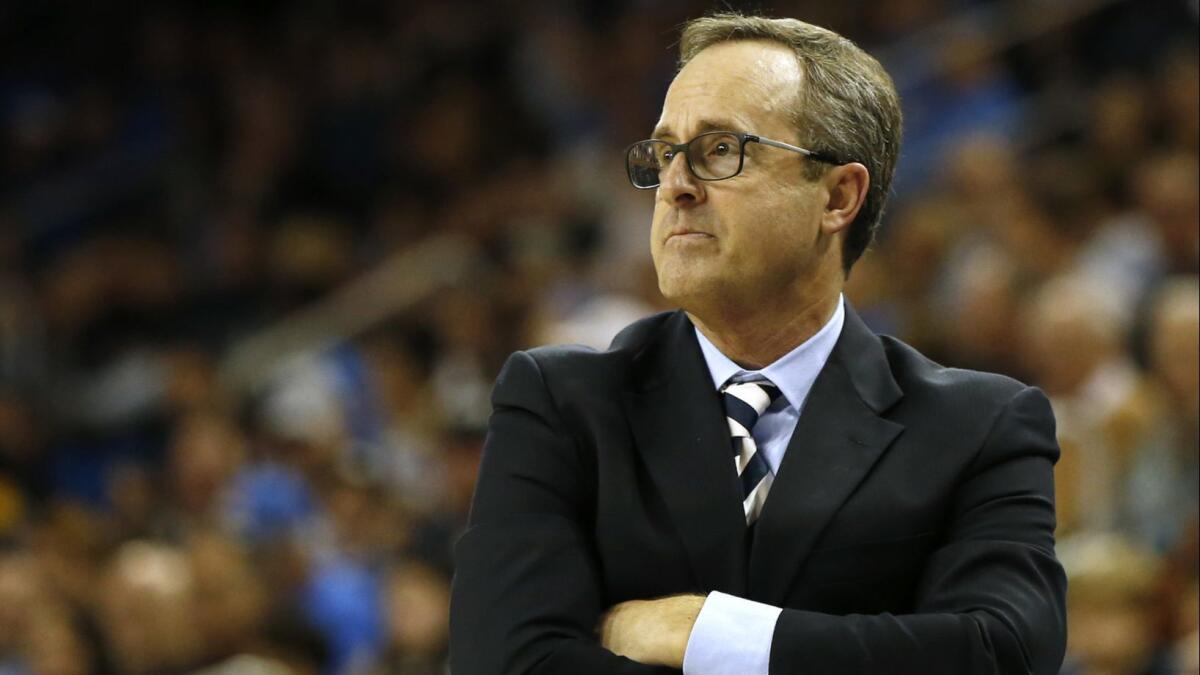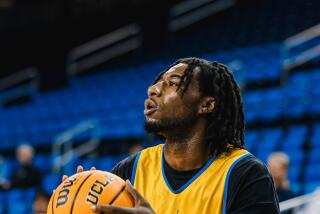Murry Bartow has a unique perspective on UCLA basketball, thanks to his father

Fate, the fickle entity that brought Murry Bartow back to his father’s UCLA, can only go so far in creating parallel story lines.
The younger Bartow is probably not getting run out of town, lest Angelenos first learn his name. Extraordinary is the barista who can get the spelling right.
“Very rarely,” said Murry, who invariably reaches for a cup to find “Murray” scrawled across the side.
Before the season, when his schedule allowed such indulgences, Bartow could easily go 35 miles on a weekend bike ride from his apartment in Culver City to the South Bay and back without being recognized.
Given the Bruins-in-ruins state of his team in a city that increasingly dotes on its professional options, UCLA’s new coach remained shrouded in anonymity even after replacing the dismissed Steve Alford last week on an interim basis.
The burden is nothing like that faced by his late father Gene, who, in his final weeks on the job at UCLA in the spring of 1977, showed up pale and gaunt to star forward Marques Johnson’s New York hotel room, having cloaked himself in a heavy overcoat and hat to avoid being spotted in public.
“I remember my dad saying, ‘Look, coach, it’s not worth it, the happiness of your family, the stability of your family,’ ” Johnson recalled. “It might be a good idea to go someplace else.’ ”
Gene Bartow’s sin was not having gone 52-9 in two seasons while winning as many Pac-8 Conference titles and reaching one Final Four, it was replacing the irreplaceable John Wooden. Before he died in 2012 after a 2 1/2-year battle with stomach cancer, Bartow had relayed to a friend the encumbrance of his time in Westwood, noting that even if he won a national championship it would leave him nine short of Wooden’s record haul.
Legacies can be complicated. Nobody knows that better than Murry, the onetime UCLA ball boy who is now running his father’s program more than four decades later.
“It obviously puts a little different spin on it,” Murry said.
::
He arrived intending to save the defense, nothing more.
That was UCLA’s unrelenting weakness in recent years under Alford. So the coach jettisoned lead recruiter David Grace last spring in favor of the 57-year-old Bartow, who was known as a shrewd defensive mind going all the way back to his two seasons as a graduate assistant under Indiana’s Bobby Knight in the 1980s.
Part of Bartow’s duties back then involved risking his eardrums by making calls during intrasquad scrimmages. Heaven forbid he called a charge if Knight thought it was a block.
“I did have the good fortune — pardon the joke there — of officiating as a G.A.,” Bartow said wryly. “If we didn’t make the right call, we’d hear about it.”
In Bartow’s midst was a shooting guard who would lead the Hoosiers to the 1987 national championship. His name was Steve Alford.
The Indiana connection would linger for many years. Gene Bartow sometimes ribbed his easygoing son by calling him “Little Knight” when Murry later joined his staff at Alabama Birmingham, where the Bartows had taken refuge to launch the basketball program after departing UCLA.
Murry played for his father, coached beside him and eventually replaced him as the Blazers’ coach in 1996 upon the conclusion of a career that would land Gene in the National Collegiate Hall of Fame after 647 college victories and a Final Four appearance with Memphis State in addition to UCLA.
His son was just commencing a 19-season run that would also include stops at East Tennessee State and South Florida. The younger Bartow compiled a 328-264 record, collecting seven 20-win seasons and reaching four NCAA tournaments. But he never made it out of the first round and was let go everywhere he went.
A 2-0 start with the Bruins hasn’t budged his standing as the longest of longshots to receive serious consideration for the permanent job. The basketball nomad may be seeking a new apartment lease soon enough.
::
For two years, the middle schooler earned his seat inside Pauley Pavilion.
Stationed at the base of one basket support, young Murry wiped the floor, fetched balls and steeped himself in every exchange between his gentlemanly father and the players he coached. There were other perks to the job, Murry given access to the locker room and accompanying his father on a golf outing with Wooden.
He was kind of always around at practices, at games. Just quiet, kind of wide-eyed and impressionable, taking everything in.”
— Marques Johnson on a young Murry Bartow
Little did Murry know that some might remember him.
“He was kind of always around at practices, at games,” Johnson said. “Just quiet, kind of wide-eyed and impressionable, taking everything in.”
Well, maybe not everything. Murry said he had no idea of the strain his father felt coaching UCLA. Win or lose, Gene gave off the same vibe every time he returned to their Northridge home.
“I never saw it,” Murry said of his father’s internal struggle. “I never saw frustration. I never saw it coming, where he would make that decision to move.”
Exit strategies were contemplated not long after the Bruins followed their 1976 Final Four appearance — a loss to unbeaten and eventual champion Indiana in a national semifinal — with a second-round NCAA tournament loss to Idaho State. Along the way, Johnson remembered his coach quickly declining an offer to read the sports section at a team breakfast.
“He’s like, ‘No, no, no, no. I’m never touching another L.A. paper as long as I live,’ ” Johnson said. “That’s how much the situation had gotten to him at that point.”
Years later, when Johnson learned that his old coach was on the verge of succumbing to cancer, he called and was shocked to receive an apology from Bartow for not having taken the Bruins further during their two seasons together.
“I was like, ‘Coach, wait, wait. Hold it, hold it,’ ” Johnson said. “ ‘Man, we were 52-9, we won two Pac-8 championships at the time, [reached] a Final Four, we got upset by Idaho State my senior year, but that’s not on you. You did a terrific job.’ ”
::
The Bruins that Murry Bartow inherited a little more than a week ago were a fractured, directionless bunch. They had lost their spirit amid the four-game skid that cost Alford his job.
Bartow met with assistants Duane Broussard and Tyus Edney, who also remained on staff, and immediately altered course. UCLA would play faster, quickening its pace by trapping in the backcourt to frazzle opponents into turnovers and empty possessions.
The tactical maneuvering was only part of the salvation plan. Edney, whose baseline-to-baseline layup during the 1995 NCAA tournament served as the enduring image of the Bruins’ last national championship run, gave an impassioned speech about what it should feel like to wear the UCLA uniform.
“We want to play like a team and look like a team,” Bartow said, “and that was a theme.”
Energetic victories over Stanford and California followed. The players’ body language told the story of their belief in their new coach, point guard Jaylen Hands tenderly draping an arm around Bartow’s shoulder and small forward Kris Wilkes slapping his hand in celebration of a season on the upswing.
“I feel like we’re watching each other get better,” center Moses Brown said, “and the more fun we’re having on the court, the more confidence we’re getting.”
Bartow’s schedule hasn’t changed since his title bump, mostly because it would be hard to add more hours to his workday. He rose at 4:30 Monday morning and was watching game footage 15 minutes later as his Bruins (9-6 overall, 2-0 Pac-12) prepared to face preseason conference favorite Oregon (9-5, 0-1) on Thursday in Eugene.
Bartow arrived in his office before 8 o’clock, meeting with a reporter about an hour later in a plush film room inside the Mo Ostin Basketball Center. As the conversation meandered from past to present, from father to son, the coach interrupted his own answer to say that the interview could go on past its allotted time.
This Bartow was in no rush to go anywhere else.
“I’ve got time right now,” he said, “so don’t feel like we’ve got to hurry.”
Follow Ben Bolch on Twitter @latbbolch
More to Read
Go beyond the scoreboard
Get the latest on L.A.'s teams in the daily Sports Report newsletter.
You may occasionally receive promotional content from the Los Angeles Times.







